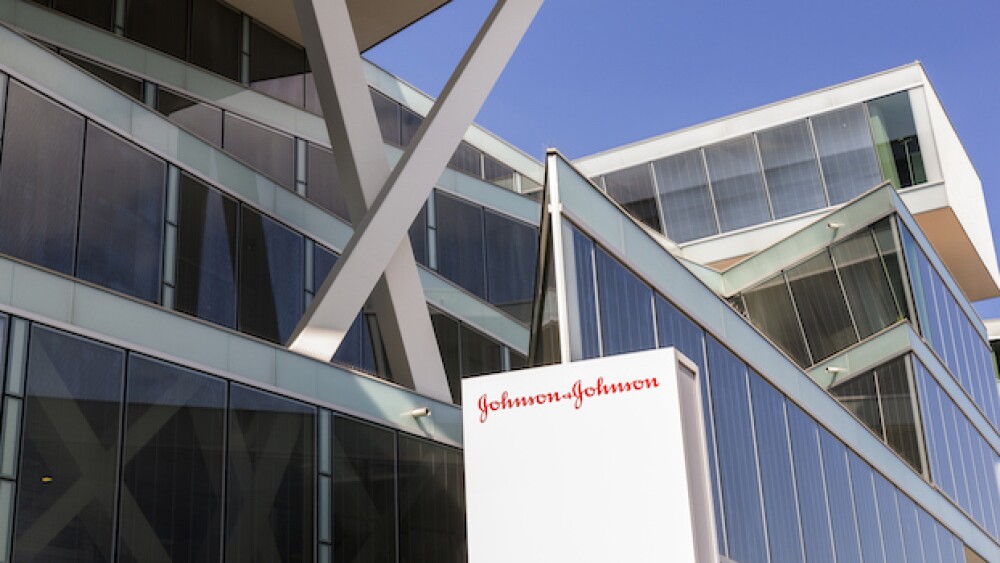Social media campaigns may have been one factor that prompted Johnson & Johnson and Danaher to make a TB treatment and a test more accessible in low- and middle-income countries.
Pictured: A Johnson & Johnson building in Switzerland/iStock, yuelan
An estimated 10.6 million people were diagnosed with tuberculosis in 2021, the most recent year for which the World Health Organization has released numbers, and more than 1.6 million people died from the disease. The number of annual cases has fallen by 22% since 2015 but remains high even though TB, a bacterial infection of the lungs, is both preventable and curable.
Lack of funds is a major obstacle to reducing the burden of TB. The Stop TB Partnership’s Global Plan to End TB projected last year that $16.1 billion would be required to provide TB prevention, diagnostics and treatment services to the 128 low- and middle-income countries (LMICs). In the case of LMICs, the average total cost of a TB infection is more than half of the affected person’s annual income.
A group of global healthcare access advocacy organizations with support from a large online community recently took to social media to demand that Johnson & Johnson and Danaher Corporation make their TB healthcare products more accessible to the public. But while the campaigners ultimately declared victory after their requests were at least partially met, it’s not clear whether their actions played a significant role in the companies’ decisions around those products.
Campaigning for Generic Bedaquiline
The incidence of multidrug-resistant TB (MDR TB), an outcome of the global antimicrobial resistance phenomenon, is on the rise, further compounding TB mitigation challenges. Only three drugs on the market are effective against MDR TB infection: J&J’s bedaquiline (Sirturo), TB Alliance’s pretomanid, and Pfizer’s linezolid.
J&J’s primary patent on bedaquiline expired in July 2023 in many countries, but its secondary patent on a modified formulation of the drug is active until 2027 in 44 LMICs.
On July 11, 106 individuals and 82 international organizations sent an open letter to J&J urging it to withdraw pending secondary patent applications on all versions of bedaquiline in countries with high burdens of TB, as committing to a non-enforcement of the patent would allow these countries to access high quality generic drugs.
Before the primary patent’s expiration, a six-month treatment course of bedaquiline was priced at $270 for nations eligible for concessions via the Global Drug Facility (GDF), a World Health Organization-affiliated body that helps countries get access to high-quality anti-TB medicines, and prices could run be much higher in countries that are not eligible. One study estimated that generic versions of bedaquiline would cost around $8 to $17 per month.
In light of this price difference, John Green, an American author, YouTuber and philanthropist, uploaded a video on his channel Vlogbrothers on July 11 titled “Barely Contained Rage: An Open Letter to Johnson & Johnson.” In the video, Green says that J&J’s enforcing a secondary patent for the next four years would mean that more than six million people who would otherwise have had access to generic bedaquiline wouldn’t be able to afford it.
He calls on viewers to make a compelling case to J&J that evergreening its patent would be a bad decision and go against its credo, which states “We believe our first responsibility is to the patients, doctors and nurses, to mothers and fathers and all others who use our products and services.”
“It did feel risky. I had no idea what the response would be from our [online] community. Would they even agree with me that lowering the price of TB treatment and diagnostics was a good use of our collective energy and talents?” Green told BioSpace in an email. “We have high-quality diagnostics and treatments, but we don’t distribute them to the places where they’re most needed. This is so frustrating and horrifying to me—and so on a very basic level, we want to rectify that injustice.”
The video amassed more than a million views and set in motion a social media campaign across Twitter, Facebook and Instagram led by Nerdfighteria, an online community initially created by the Vlogbrothers. On Twitter, the group used the hashtag #PatientsNotPatents, which garnered more than 10,000 tweets in the days following the video’s release and over 2.3 million views on the top five posts carrying the hashtag.
A day after the video was posted on YouTube, J&J tweeted a rebuttal stating that the bedaquiline patents were not being used to prevent access to the drugs. Furthermore, the statement read, “we have already entered into a collaboration with the Stop TB Partnership’s Global Drug Facility (“GDF”)—the largest procurer of TB medicines—which enables them to invite potential generic suppliers and purchase generic versions” of bedaquiline.
On July 13, the Stop TB Partnership confirmed that it had entered an agreement with J&J that would allow distribution of generics in 96 low and middle-income countries.
Critics, however, pointed out that the deal would exclude several countries with a high burden of MDR TB from access to affordable bedaquiline, as they do not procure their drugs through GDF. A group of international organizations—Médecins Sans Frontières or Doctors Without Borders, Partners In Health and the Treatment Action Group —wrote an open letter to J&J asking the company to clarify scope of rights granted to GDF, the reason why several countries with high TB burden were excluded from the deal and the possibility of procuring generic medications without going through GDF. MSF also appealed to J&J to not engage in legal action against drug manufacturers producing and supplying generic versions.
J&J made a second announcement on September 29 declaring that the company will not be enforcing its patents on bedaquiline in 134 LMICs, thereby allowing generic drug manufacturers to produce and provide a high-quality generic version of the lifesaving medication within these countries.
Asked what led to this decision, a company spokesperson wrote in an email to BioSpace that “Johnson & Johnson’s decision builds on a decade of investments in collaborative efforts to help countries sustainably scale up access and bring people living with multidrug-resistant tuberculosis (MDR-TB) into treatment, and addresses any misperception that access to our medicine is limited or restricted.”
While J&J did not directly address the social media campaigns, its move was hailed as a victory by Médecins Sans Frontières, Partners and Health and by Green.
Cody Powers, a principal at the consulting firm ZS Associates, had a different take. “These decisions are always multifold,” he said. “Sometimes it may appear that . . . social media or public opinion drives it, but oftentimes there are other variables that are co-linear or correlated—for example, how much patent life is left or how strong the intellectual property is.”
The capacity of many developing countries to pay for drugs is significantly lower than in mature markets, which squeezes not only revenue but also the ability of pharma companies to distribute their products. In such situations, if the company decides to enforce its patent, it is still accountable for the proper distribution of the drugs, either with the help of an NGO or the WHO. However, if it declines to enforce the patent, then generic systems that are already well equipped to reach the developing world can pick up from where the patent holder left off, Powers said, suggesting that such logistical considerations might have played a role in J&J’s decision to allow generic drug production in 134 LMICs.
Time for $5 . . . or $8
Following the largely positive response to his previous call, Green released a video on September 12 urging viewers to join the “Time for $5” campaign, an initiative led by Médecins Sans Frontières Access and the Treatment Action Group. The campaign called on Danaher Corporation and its subsidiary Cepheid to lower the price of their Xpert TB tests from $9.98 to $5 per cartridge. Xpert rapidly detects the presence of the TB-causing bacterium and reveals whether it is a drug-resistant strain; the U.S. Centers for Disease Control and Prevention describes it as “revolutionizing tuberculosis (TB) control.”
Green’s followers not only took to different social media platforms to advocate for Time for $5 but also created graphics and a website for it. The website garnered more than 200,000 views, and the hashtag #Timefor5 gained more than 600,000 views on X (formerly Twitter) within a week of Green releasing the video. “Generally, the whole thing was a result of John Green’s ‘secret’ live streams … where he requested the assistance of the community,” said Marlon Wolfersdorf, a member of the Nerdfighteria Discord server who led the development of the information website.
On September 19, Danaher released a press note stating that the Xpert TB test cartridges will be available for the at-cost price of $7.97 to the Global Fund, a worldwide partnership for defeating HIV, TB and malaria in less-developed countries, via Cepheid’s Global Access Program. In the press release, Rainer M. Blair, Danaher’s president and CEO, highlighted the company’s commitment to solving healthcare challenges that affect the lives of patients across the globe.
While it did not mention the campaign directly, the release stated, “Cepheid noted that recent speculation, based on the analysis of partial information, has significantly understated the cost of its TB test cartridges, resulting in considerable overstatement of their profitability.” Danaher declined to comment further when asked by BioSpace what prompted it to reduce the cost of the Xpert cartridges by 20%.
Future Impact
J&J’s recent decision will significantly change the lives of 450,000 people who develop MDR TB each year since three of every four patients on treatment receive a bedaquiline-containing regimen, the J&J spokesperson said.
As for Xpert, “Reducing the price of these sophisticated TB tests by 20% will give a significant boost to our collective efforts to scale up testing and save lives,” said Peter Sands, executive director of the Global Fund, in Danaher’s announcement about the price drop.
Nerdfighteria’s vision for the future doesn’t stop here. The community is full of passionate people who will keep up their fight against TB up, Wolfersdorf said.
Sanjukta Mondal is a freelance writer based in Kolkata, India. Reach her at sanjuktamondal.sm@gmail.com.
Clarification (November 8): This article has been updated to state that Danaher will offer Xpert test cartridges to the Global Fund at cost.






